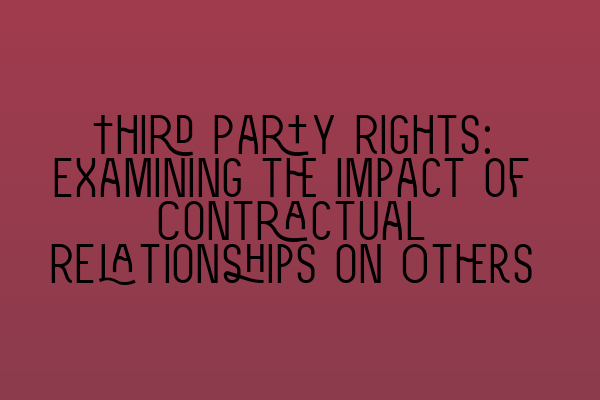Third Party Rights: Examining the Impact of Contractual Relationships on Others
When it comes to contract law, the focus is primarily on the parties involved in the contract. However, it is important to consider the impact of contractual relationships on third parties as well. Third party rights can arise in certain situations and can have significant implications for all parties involved. In this blog post, we will explore the concept of third party rights and examine their legal implications.
What are Third Party Rights?
Third party rights refer to the rights and obligations that may be conferred upon or imposed upon individuals or entities who are not originally party to a contract. In other words, these are rights that are granted or imposed on someone who is not directly involved in the contractual agreement.
There are several ways in which third party rights can arise. One common scenario is when a contract explicitly includes provisions for the benefit of third parties. For example, let’s say a homeowner hires a contractor to build a house and includes a provision in the contract that stipulates the contractor will provide a warranty on the construction to the future buyers of the house. In this case, the future buyers would have third party rights under the contract.
Another way third party rights can arise is through the doctrine of privity of contract. Privity of contract is a legal principle that generally states that only the parties to a contract can enforce its terms. However, there are exceptions to this rule that allow third parties to enforce certain rights under a contract.
Legal Implications of Third Party Rights
The existence of third party rights can have significant implications for the parties involved in a contract. For example, if a contract includes provisions for the benefit of third parties, the parties to the contract may be held liable to those third parties if they fail to fulfill their obligations.
On the other hand, if a contract does not specifically include provisions for third party rights, the doctrine of privity of contract may limit the ability of third parties to enforce the contract. This can create uncertainty and potential disputes, especially when a third party suffers harm as a result of the contract.
It is important for parties entering into contracts to carefully consider the potential impact on third parties and to clearly define the extent of any third party rights in the contract. By doing so, they can mitigate the risk of disputes and potential liability.
How to Address Third Party Rights in Contracts
To properly address third party rights in contracts, it is essential to clearly define the rights and obligations of all parties involved. This can be done by including specific provisions in the contract that outline the rights of third parties and any obligations the parties have towards them.
Additionally, parties should consider including provisions that address the circumstances under which a third party may enforce their rights, as well as any limitations or exclusions on third party rights. This will help to clarify the intent of the contract and reduce the potential for disputes.
Conclusion
Third party rights are an important consideration in contract law. It is crucial for parties to understand the legal implications of third party rights and take appropriate measures to address them in their contracts. By doing so, they can protect their interests and minimize the risk of disputes.
If you’re preparing for the SQE exams, check out our related articles for valuable resources and exam preparation courses:
– [SQE 1 Practice Exam Questions](https://fqps.co.uk/sqe/sqe1-preparation/mcq-practice-quiz)
– [SQE 1 Practice Mocks FLK1 FLK2](https://fqps.co.uk/sqe/sqe1-preparation/practice-mocks-quiz)
– [SQE 2 Preparation Courses](https://fqps.co.uk/sqe/sqe2-preparation)
– [SQE 1 Preparation Courses](https://fqps.co.uk/sqe/sqe1-preparation)
– [SRA SQE Exam Dates](https://fqps.co.uk/sqe/sqe1-sqe2-exam-dates)
At SQE Contract Law, we are dedicated to providing comprehensive resources and courses to help you succeed in your SQE exams and excel in your legal career.
